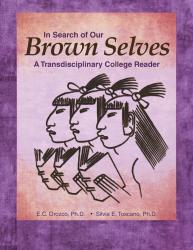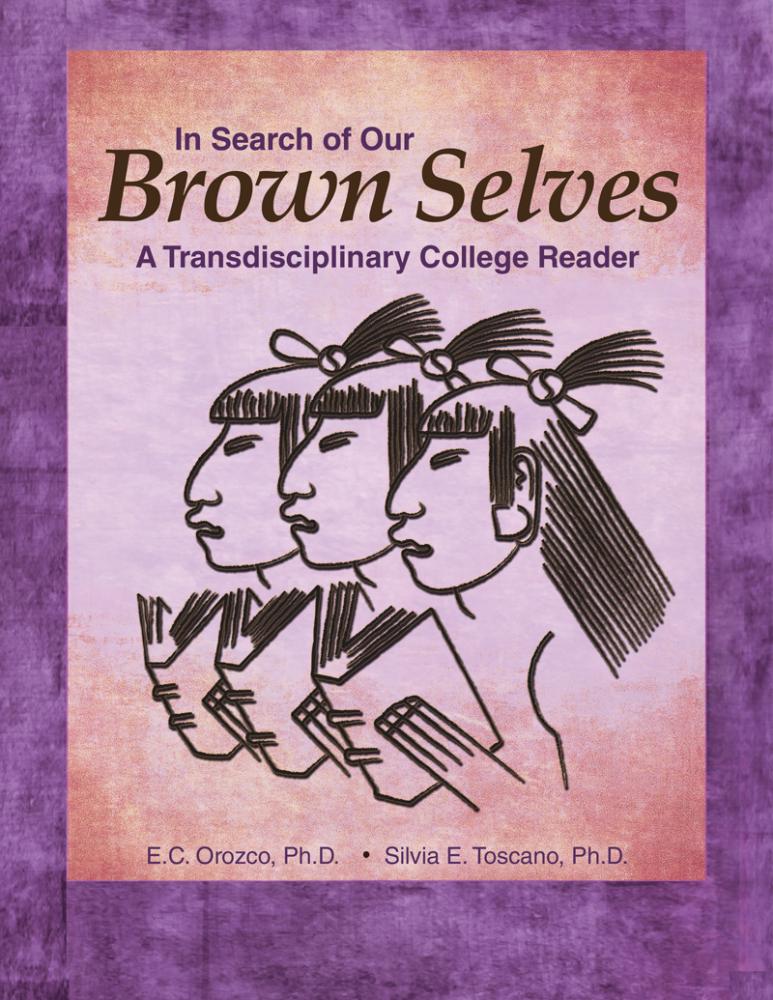In Search of Our Brown Selves: A Transdisciplinary College Reader
Author(s): Enrique C Orozco , Silvia E. Toscano
Edition: 2
Copyright: 2021
Pages: 258
Choose Your Platform | Help Me Choose
In Search of Our Brown Selves: A Transdisciplinary College Reader offers students an opportunity to (re)examine a wide spectrum of perspectives that situate the importance of foundational texts central to shaping Chicano thought, behavior, and identity, such as El Plan de Aztlán and “I am Joaquin.” However, we have also prioritized more recent contributions and voices of those who identify as Ch(X)icano/a/x educators and cultural practitioners that continue to question the purpose of Chicano Studies as well as the methodologies that influence it. Like the co-editors, many of the new contributors are educators-scholars-activists who teach or have taught or have worked at community colleges and universities throughout Southern California. Their voices are essential to any equity, diversity, or social justice imperatives that may seemingly exist at educational institutions of higher learning.
Furthermore, it must be noted that we are also very well-aware of the limitations that departments/ divisions oftentimes place on educators; for that reason, we have made the conscious decision to identify the reader as a Transdisciplinary College Reader to allow for it to exist within but also to travel outside of Chicano Studies classrooms. We see this as a responsibility set forth upon us by our ancestors to continue to cultivate our knowledge systems and learning modalities in ways that are meaningful to us—wherever we may find ourselves.
We would like to emphasize that each unit offers a starting point for deeper contextualization and analysis depending on the class in which it is assigned, the educator facilitating learning, and the students and their respective backgrounds and lived experiences. Of course, there is room to enhance the content and facilitate engagement of the readings as each learning situation will differ. Each unit ends with a set of questions that are intended to be a starting point for initial discussion, brainstorming, journaling, and continued reflection.
It is our sincerest intention that In Search of Our Brown Selves: A Transdisciplinary College Reader will exist as a living document (that will continue to grow and expand) and that it will help to remind those who encounter it of the importance of the Chicano Movement, the Chicano people, and the Chicano essence. Not only that, but we also hope that it will contribute to informing our youth, reminding them of how wonderful it will be—to rise—and understand the reach of their empowered self-actualization.
Introduction
Unit 1:NUESTRA TIERRA NATAL
Reclaiming the Homeland: The Quest for Aztlán
El Plan de Aztlán
A State-of-War or a Permanent State of Insurrection
Rodriguez, Roberto (Dr. Cintli)
Reclaiming the Term Chicano
Orozco, E.C.
El Plan de Los Angeles: Toward a Path to Implement Raza and Ethnic Studies in K-14 Learning Environments
Raza Studies Now!
(Elias Serna)
Unit 2: NUESTRA EXPERIENCIA EN AZTLÁN
Understanding the Voices of Aztlán-the Struggle of a People
Confessions of a Xicana (COAX): Dismantling Shame While Walking with the Ancestors and Transforming Pain Into Beauty
Moreno Sandoval, Cueponcaxochitl D. and Miriam G. Valdovinos
Memoria de Aztlán: One Xicano’s Journey
Maldonado, José A.
Living Life as a Ceremony: Identity, Sacredness and Healing
Coronado, Heidi M.
Unit 3: NUESTROS COMPLEJOS CULTURALES
Reviewing Identity in the Literature and Art of Aztlán
Cultural Nationalism and Xicano Literature During The Decade of 1965–1975
Alurista
I Am Joaquin
Gonzales, Rodolfo “Corky”
In Search of My Apá’s Marlboro 100s
Figueroa, María
Hummingbird Chant
Ayocuan, Tezozómoc
I Didn’t Ask to be Mexican
Ayocuan, Tezozómoc
Lost Aztlan
Ayocuan, Tezozómoc
Dreaming of Consciousness
Ayocuan, Tezozómoc
We are not Mestizos: We are Native Americans
Orozco, E.C.
Four Major Ethnic Mexican American Typologies
Orozco, E.C.
The Vendido Character
Orozco, E.C.
Unit 4: NUESTRAS LUCHAS POLITICAS
Questioning the Effects of Internal Colonialism and Class Exploition
Chicano Borders in the Culture of Separation
Orozco, E. C.
The Barrio as an Internal Colony
Barrera, Mario; Carlos Muñoz and Charles Ornelas
Toward the Study of Chicano Colonialism
Almaguer, Tomás
Colonial Dispossession and Subjugation as Contexts for Understanding Chicanx-Mexican Labor
Zavala, Miguel
Communitarianism: A Shield Against Alien Ideologies
Orozco, E.C.
Unit 5:NUESTRA ILUMINACIÓN EDUCATIVA Y CULTURAL
Exploring Possibility: Self-determination through Education
From the Chicano Labyrinth of Solitude
Orozco, E. C.
Research Note
García, Mario T.
The Rise of the Chicano Student Movement and Chicano Power
Muñoz, Carlos
The Arizona Assault on Chicano Freedom
Orozco, E. C.
Teaching as a Healing Craft: Decolonizing the Classroom and Creating Spaces of Hopeful Resistance through Chicano-Indigenous Pedagogical Praxis
Toscano, Silvia
Reflections on Chican@ Studies: Notes on Xican@ Knowledge and Intellectual Histories in Higher Education
Vasquez, Kristian
Unit 6: NUESTRAS VISTAS DE FAMILIA
Acknowledging the Complexities of Family Life, Gender and Sexuality
Campesina Epistemologies and Pedagogies of the Spirit: Examining Women’s Sobrevivencia
Galván, Ruth Trinidad
Fathering Latina Sexualities: Mexican Men and the Virginity of their Daughters
González-López, Gloria
Machismo and the Chicano Experience
Orozco, E. C.
Queer Aztlán: The Re-Formation of Chicano Tribe
Moraga, Cherrie
El Hombre Noble Buscando Balance: The Noble Man Searching for Balance
Tello, Jerry
A Chicano’s Reflections: Healing Colonialist Masculinity
Castillo, J. Luis
Mom’s Healing Altar and Dad’s Obsidian Blade: Building the Indigenous Xicana/o Family Healthcare Kit
Márquez, Claudia Itzel and Santiago Andrés Garcia
In Search of Our Brown Selves: A Transdisciplinary College Reader offers students an opportunity to (re)examine a wide spectrum of perspectives that situate the importance of foundational texts central to shaping Chicano thought, behavior, and identity, such as El Plan de Aztlán and “I am Joaquin.” However, we have also prioritized more recent contributions and voices of those who identify as Ch(X)icano/a/x educators and cultural practitioners that continue to question the purpose of Chicano Studies as well as the methodologies that influence it. Like the co-editors, many of the new contributors are educators-scholars-activists who teach or have taught or have worked at community colleges and universities throughout Southern California. Their voices are essential to any equity, diversity, or social justice imperatives that may seemingly exist at educational institutions of higher learning.
Furthermore, it must be noted that we are also very well-aware of the limitations that departments/ divisions oftentimes place on educators; for that reason, we have made the conscious decision to identify the reader as a Transdisciplinary College Reader to allow for it to exist within but also to travel outside of Chicano Studies classrooms. We see this as a responsibility set forth upon us by our ancestors to continue to cultivate our knowledge systems and learning modalities in ways that are meaningful to us—wherever we may find ourselves.
We would like to emphasize that each unit offers a starting point for deeper contextualization and analysis depending on the class in which it is assigned, the educator facilitating learning, and the students and their respective backgrounds and lived experiences. Of course, there is room to enhance the content and facilitate engagement of the readings as each learning situation will differ. Each unit ends with a set of questions that are intended to be a starting point for initial discussion, brainstorming, journaling, and continued reflection.
It is our sincerest intention that In Search of Our Brown Selves: A Transdisciplinary College Reader will exist as a living document (that will continue to grow and expand) and that it will help to remind those who encounter it of the importance of the Chicano Movement, the Chicano people, and the Chicano essence. Not only that, but we also hope that it will contribute to informing our youth, reminding them of how wonderful it will be—to rise—and understand the reach of their empowered self-actualization.
Introduction
Unit 1:NUESTRA TIERRA NATAL
Reclaiming the Homeland: The Quest for Aztlán
El Plan de Aztlán
A State-of-War or a Permanent State of Insurrection
Rodriguez, Roberto (Dr. Cintli)
Reclaiming the Term Chicano
Orozco, E.C.
El Plan de Los Angeles: Toward a Path to Implement Raza and Ethnic Studies in K-14 Learning Environments
Raza Studies Now!
(Elias Serna)
Unit 2: NUESTRA EXPERIENCIA EN AZTLÁN
Understanding the Voices of Aztlán-the Struggle of a People
Confessions of a Xicana (COAX): Dismantling Shame While Walking with the Ancestors and Transforming Pain Into Beauty
Moreno Sandoval, Cueponcaxochitl D. and Miriam G. Valdovinos
Memoria de Aztlán: One Xicano’s Journey
Maldonado, José A.
Living Life as a Ceremony: Identity, Sacredness and Healing
Coronado, Heidi M.
Unit 3: NUESTROS COMPLEJOS CULTURALES
Reviewing Identity in the Literature and Art of Aztlán
Cultural Nationalism and Xicano Literature During The Decade of 1965–1975
Alurista
I Am Joaquin
Gonzales, Rodolfo “Corky”
In Search of My Apá’s Marlboro 100s
Figueroa, María
Hummingbird Chant
Ayocuan, Tezozómoc
I Didn’t Ask to be Mexican
Ayocuan, Tezozómoc
Lost Aztlan
Ayocuan, Tezozómoc
Dreaming of Consciousness
Ayocuan, Tezozómoc
We are not Mestizos: We are Native Americans
Orozco, E.C.
Four Major Ethnic Mexican American Typologies
Orozco, E.C.
The Vendido Character
Orozco, E.C.
Unit 4: NUESTRAS LUCHAS POLITICAS
Questioning the Effects of Internal Colonialism and Class Exploition
Chicano Borders in the Culture of Separation
Orozco, E. C.
The Barrio as an Internal Colony
Barrera, Mario; Carlos Muñoz and Charles Ornelas
Toward the Study of Chicano Colonialism
Almaguer, Tomás
Colonial Dispossession and Subjugation as Contexts for Understanding Chicanx-Mexican Labor
Zavala, Miguel
Communitarianism: A Shield Against Alien Ideologies
Orozco, E.C.
Unit 5:NUESTRA ILUMINACIÓN EDUCATIVA Y CULTURAL
Exploring Possibility: Self-determination through Education
From the Chicano Labyrinth of Solitude
Orozco, E. C.
Research Note
García, Mario T.
The Rise of the Chicano Student Movement and Chicano Power
Muñoz, Carlos
The Arizona Assault on Chicano Freedom
Orozco, E. C.
Teaching as a Healing Craft: Decolonizing the Classroom and Creating Spaces of Hopeful Resistance through Chicano-Indigenous Pedagogical Praxis
Toscano, Silvia
Reflections on Chican@ Studies: Notes on Xican@ Knowledge and Intellectual Histories in Higher Education
Vasquez, Kristian
Unit 6: NUESTRAS VISTAS DE FAMILIA
Acknowledging the Complexities of Family Life, Gender and Sexuality
Campesina Epistemologies and Pedagogies of the Spirit: Examining Women’s Sobrevivencia
Galván, Ruth Trinidad
Fathering Latina Sexualities: Mexican Men and the Virginity of their Daughters
González-López, Gloria
Machismo and the Chicano Experience
Orozco, E. C.
Queer Aztlán: The Re-Formation of Chicano Tribe
Moraga, Cherrie
El Hombre Noble Buscando Balance: The Noble Man Searching for Balance
Tello, Jerry
A Chicano’s Reflections: Healing Colonialist Masculinity
Castillo, J. Luis
Mom’s Healing Altar and Dad’s Obsidian Blade: Building the Indigenous Xicana/o Family Healthcare Kit
Márquez, Claudia Itzel and Santiago Andrés Garcia



